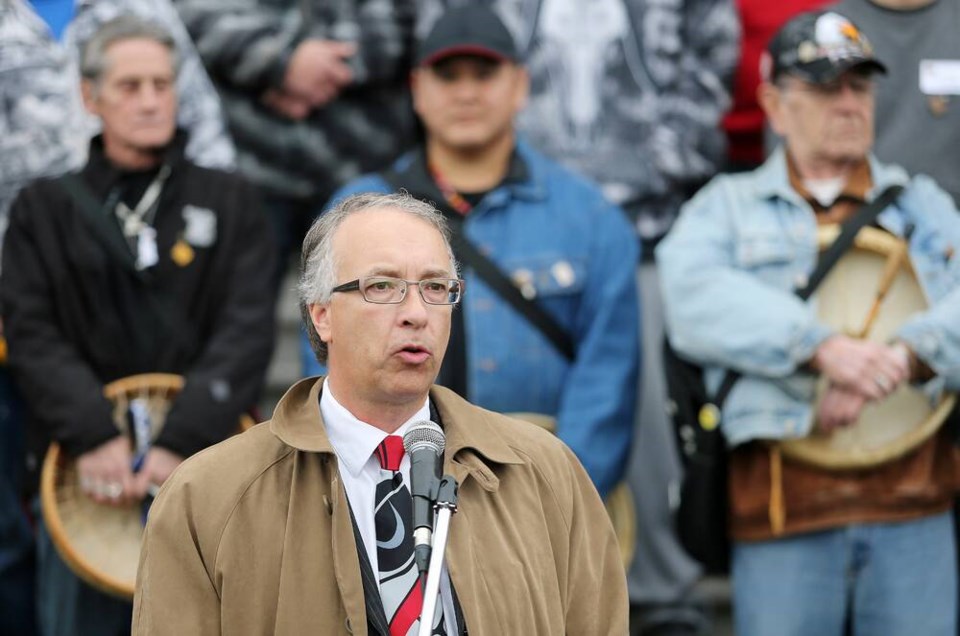The BC Conservatives wasted little time upending the political playing field Tuesday on their first day as an officially-recognized party at the legislature.
As the dust settles, we get a clearer view of the impact.
The big winner is obviously the far-right voting bloc feeding the conservative movement, which was able to watch a provincial politician take their protests against B.C.’s Sexual Orientation and Gender Identity (SOGI) school curriculum all the way to the floor of the legislature.
“Parents are concerned about the sexualization of their children in this NDP government's education system,” Conservative leader John Rustad said in question period.
“Will the minister admit that SOGI-123 has been divisive, an assault on parents' rights and a distraction on student education?”
Until now, no politician has wanted to touch this issue.
The BC United, Greens and NDP have called the anti-SOGI movement a transphobic, fear-mongering, campaign of ignorance that puts vulnerable children at risk. They’ve all said that the protesters fundamentally misunderstand SOGI, which in reality is an anti-bullying learning module, but which critics wrongly believe contains pornography and encourages children to change genders and hide information from parents.
Rustad has not only promised to scrap SOGI, he’s using the spotlight of his legislative profile to amplify those viewpoints.
“I will not be intimidated by this government, or for that matter the other two parties that are on the left side of centre,” he told reporters in the hallway of the legislature.
Which brings us to the second big winner of the rise of the Conservatives: BC New Democrats.
As much as Premier David Eby has protested the arrival of BC Conservatives as “American-style culture wars,” the NDP very much wants the Conservatives to flourish in the people’s house.
A popular Conservative party splits the centre-right vote with the BC United, creating the kind of electoral conditions that have historically led to New Democrat majority governments. A stronger Conservative party is a stronger New Democratic party.
The Conservatives give the NDP a clear villain against which it can rally its base. No longer is Donald Trump style social conservatism a hypothetical concern, it’s here right now in the legislature. The fundraising emails almost write themselves.
The more aggressive the Conservatives are in the legislature, the more Eby can swing big in his response.
“It is outrageous that he would stand here and do this,” Eby said in question period, replying to Rustad.
“He sees political advantage in picking on kids and families and teachers and schools who are just trying to do their best for kids who are at risk of suicide. Shame on him. Choose another question.”
It was a skilful evisceration, made all the more satisfying for New Democrats knowing it could be repeated again and again in the weeks ahead on BC Conservative-led social issues like abortion, medically-assisted dying and same-sex rights.
Stuck in the middle of all this is BC United, which showed Tuesday how easy it is to be lost in the shuffle amid an upstart Conservative leader and a whipped-up New Democrat premier.
Kevin Falcon spent the morning trying to drum up publicity for recruiting Houston mayor Shane Brienen as his party’s candidate against Rustad in the riding of Nechako Lakes in next year’s election. Brienen is a good candidate, and will give Rustad a run for his money, but all anyone wanted to ask Falcon about was his thoughts on Rustad, the BC Conservative polling numbers and whether any more BC United MLAs might defect to the Conservative party.
Falcon tried his own big swing against Rustad, calling him “stupid” for comparing the National Day for Truth and Reconciliation to SOGI. But it came across more petty than premier-like.
To make matters worse, Falcon was lured into participating in a standing ovation for Eby, after the premier’s verbal takedown of Rustad in question period. He did so reluctantly, you could tell, but everyone else around him was already standing up.
Falcon reiterated he will not chase Rustad to the far right to try and lure back those former BC United supporters, but will instead hold the line on a moderate, centrist approach.
“I think that most British Columbians are common-sense, mainstream, centre-right individuals and they just want to have people that can represent them in a common sense way,” he said.
“I’m not interested in going after the extremes. The extremes can park themselves at the NDP and the BC Conservatives.”
The strategy could work if BC United can pry away centrist voters in Metro Vancouver from the NDP. But if that fails, and BC United has also given up its right-wing flank to the Conservatives, then Falcon is leading his party to slaughter in next year’s election.
It’s been decades since B.C. has had four officially-recognized parties in the house. The dynamics are fascinating. But the political fallout is only just beginning.
Rob Shaw has spent more than 15 years covering B.C. politics, now reporting for CHEK News and writing for Glacier Media. He is the co-author of the national bestselling book A Matter of Confidence, host of the weekly podcast Political Capital, and a regular guest on CBC Radio. [email protected]





